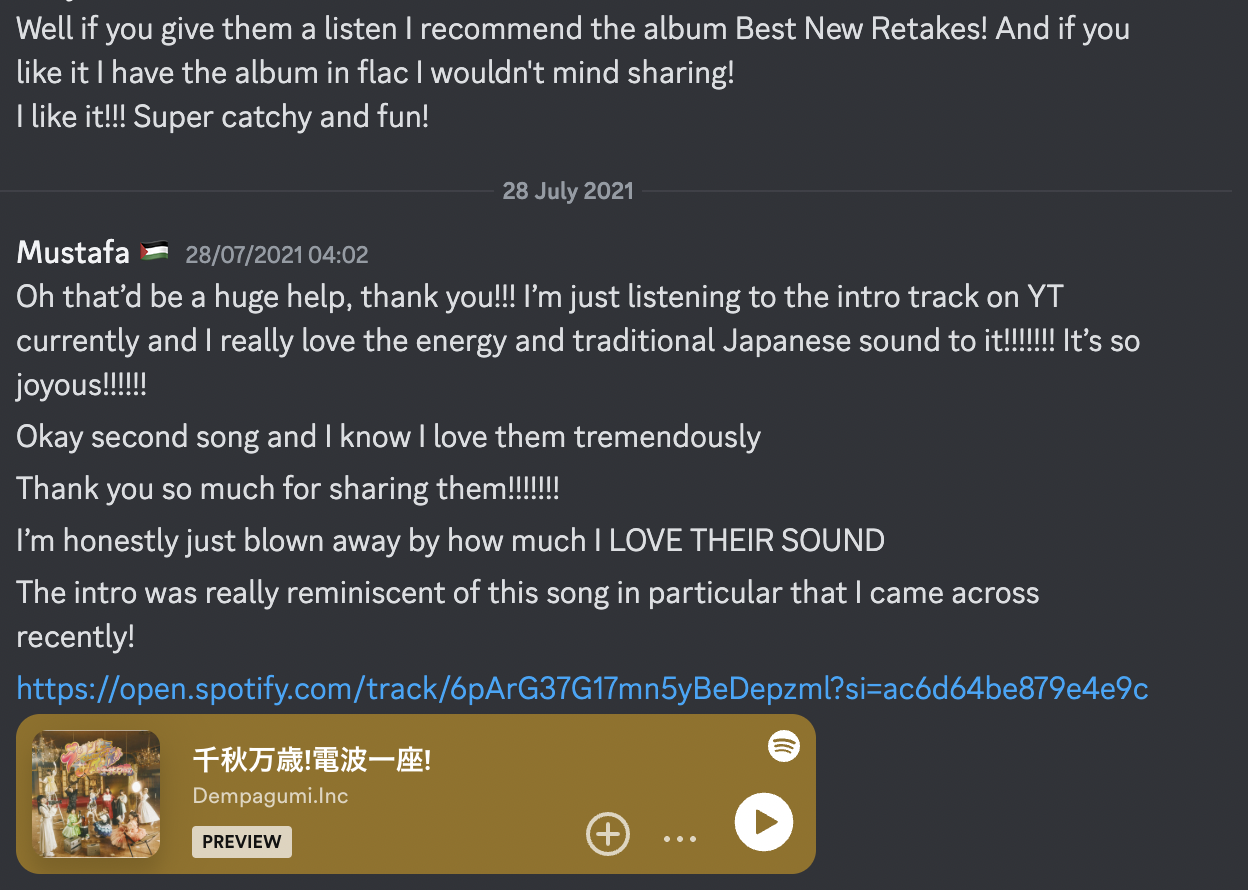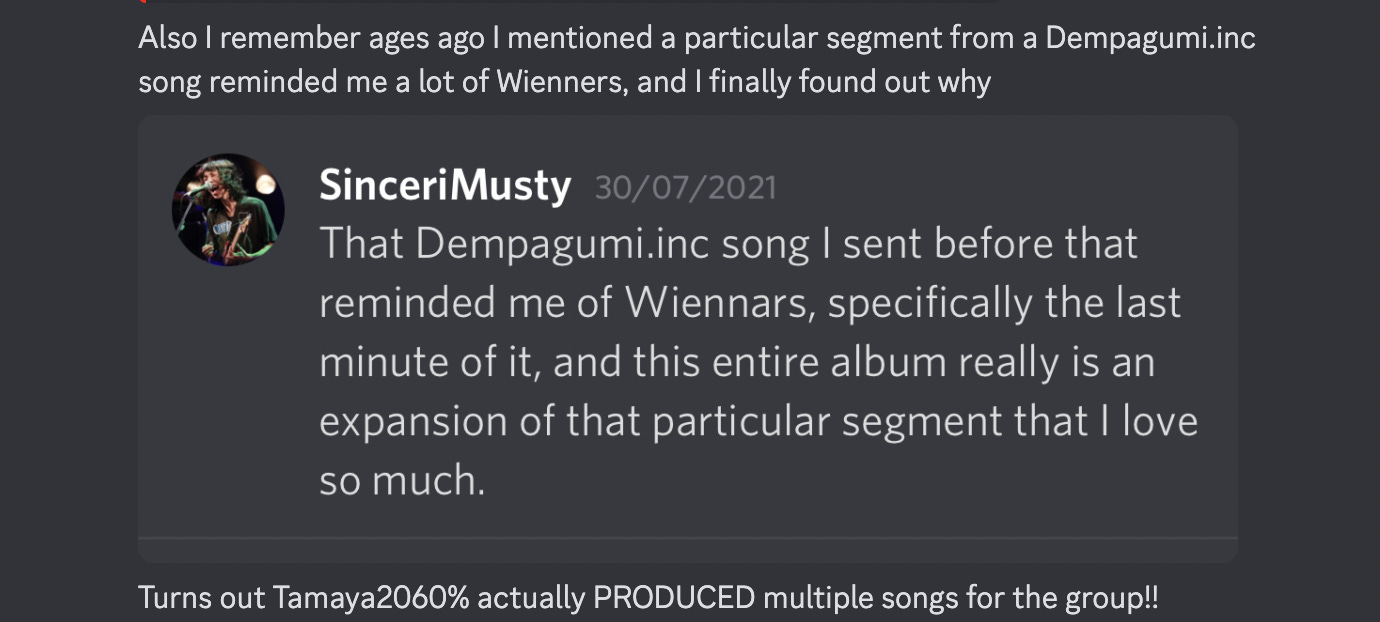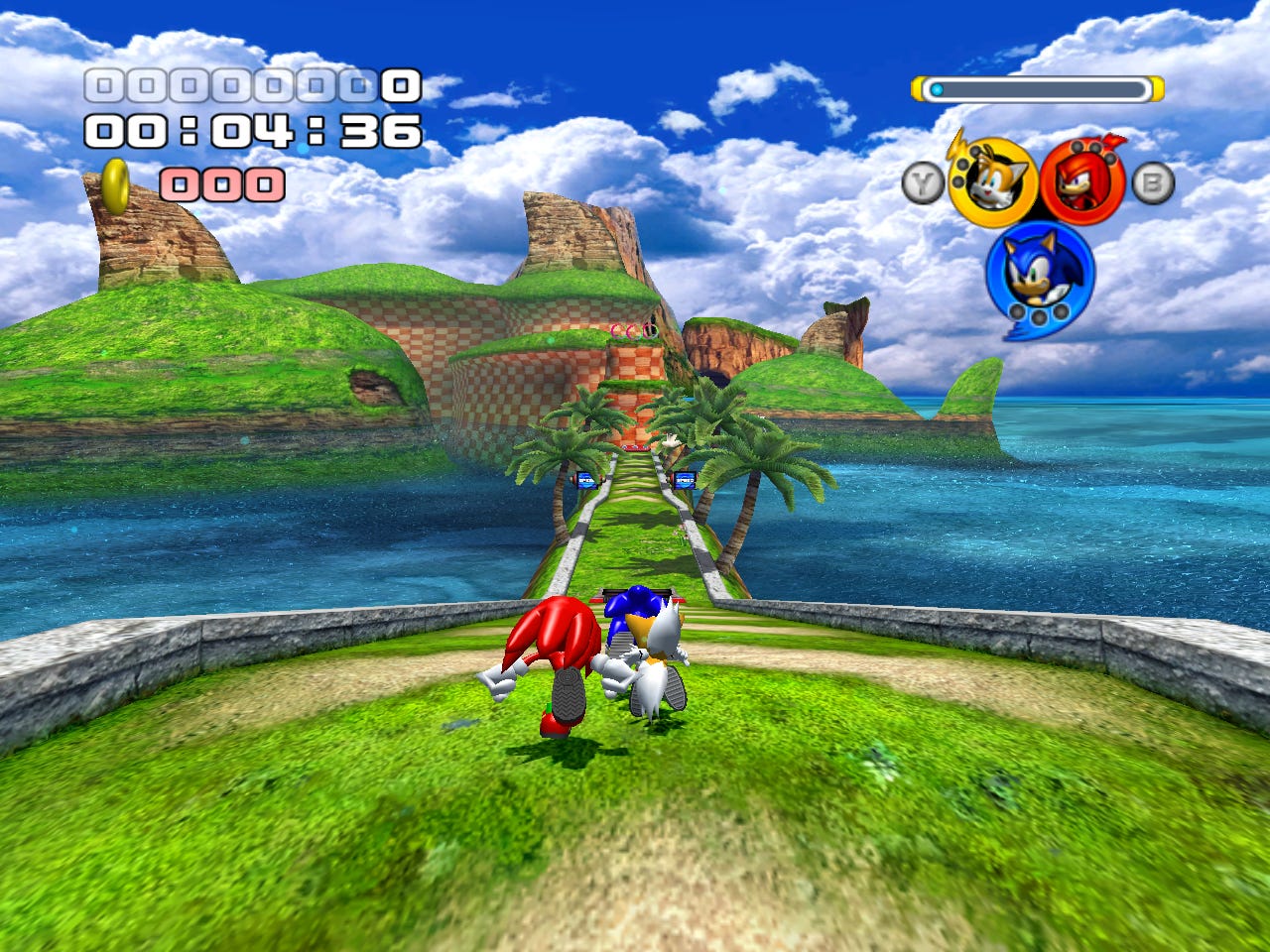With the ongoing genocide that Palestinians are currently facing, I wish to bring attention to their cause by dedicating this foreward to them. If you are able to, please consider donating to this charity which donates 100% to supporting Palestinians both now and in the future.
https://donorbox.org/gaza-waqf
Please remember Palestine during this time of need.
-
In late 2020, I dug through DAOKO’S discography and became fascinated with her song ‘Juicy’. Thanks to an Apple Music trial (I was broke at the time), I was able to enjoy discovering new music at a rapid pace, and I was eventually led to the music of Dempagumi.inc, the first song of theirs I heard being ‘Princess Dempa Power Shine On!’. Prior to this, I hadn’t really listened to idol groups at all, and this particular song was such a refreshingly honest perspective compared to what I’d expected of the genre: using a slow and elegant introduction as a bait-and-switch for a playfully transparent reflection of the life of an idol.
The second song of this single release is ‘Senshubanzai!Dempaichiza!’. It has a completely different structure and pace, yet flows naturally when played immediately after the first song on the release. It’s noticeably more hectic and boasts even more frequent drastic changes in singing inflection, yet not once does it feel bloated or messy. My favourite part has always been the final stretch when it suddenly flourishes into a rigorously rhythmic anthem to the prideful impact of a marching beat. These two songs became favourites of mine to listen to during this time period, yet the core of what kept me returning to them would only become apparent half a year: ‘Senshubanzai!Dempaichiza!’ was produced, written, and arranged by Tamaya2060%, the frontman of Wienners! He also produced ‘Juicy’ by DAOKO, so I was a big fan of his sound before I even knew who he was!
I’m still definitely not super knowledgeable on idol groups, but I’ve always enjoyed the eclectic form of Dempagumi.inc’s discography, and Tamaya2060% role in their story is one of the things I love most about their sound!
Earlier that year I’d met a new friend, Stanley, through Bandcamp, and we quickly began to talk loads thanks to many overlaps in video game and music interests. A mainstay of our conversations, to this day, remains our constant back-and-forth recommendations of musicians we’ve recently discovered, and it was through his recommendation that I discovered Wienners in July 2021. I was captivated by their sound from my first listen, and I heard the sonic similarity to ‘Senshubanzai!Dempaichiza!’ without yet even knowing of how they were connected.
(((Please excuse the misspelling)))
This connection alone made Wienners a really special band to listen to, but their discography encompassed so many different thoughts and feelings that it still hasn’t lost any of the charm it had on first listen. I didn’t have my headphones to hand at the time, so I simply listened to the first minute or so through my phone speakers, and that alone was enough to convince me of giving it a full play as soon as possible. My subsequent ‘proper’ listen was so impactful that I still remember everything about it, to this day. The FLAC copy of ‘Best New Retakes’ Stanley shared with me has had a constant presence on my music player for over two years now, becoming a literal time capsule of Summer 2021 when I cycled through it over and over again, and I am forever indebted to him for sharing the album with me.
-
Best New Retakes
The original band lineup consisted of Tamaya2060% on guitar, Max on synth, _560 on bass, and Manabu City on drums. Max and Manabu City left the band, and were replaced by AsamiSae and Kozo in 2015. This album serves as a celebration of both the ‘first’ era of Wienners as well as a commemoration for their next, as it consists primarily of rerecordings of older Wienners songs, alongside a few brand new releases.
The album opens with ‘W’, a fully instrumental song which serves as the perfect introduction to both the album and Wienners’ entire discography: a place where rhythm is synonymous with serenity, and punctuated by rollercoasters of energy. A gentle beat builds up to a ceremonious symphony of synths and electric guitar whispers, culminating in Tamaya2060%’s (probably) favourite sample to use: “IYOOOOOOOOOOO!”.
And before those chants even have a second to dissipate, the ‘proper’ start sounds with ‘Cult Pop Suicide’: “WE ARE LIBERTY CULT POP AGE FREE VOID IT’S LIKE A SUUUUUUUN!!!!!!!!”. It finishes before I’m even able to reel from its introduction.
‘Rescue Ranger’ was the song to make me think “WHO is the drummer for this band??”. Every member of Wienners shines so brightly on every track, but Kozo’s breakneck pace truly makes this song. It’s also impossible for me to not wear the biggest smile when I listen to the swarm of solos that follow 1:22.
_560’s makes his presence known on ‘Juliana Disco Zombies’, with the song pausing multiple times to make room exclusively for his bass’ rumination. This is also the song that made me realise how much I loved the band’s sense of humour: the screams “BASH ZOMBIES” and “JULIANAAAAAAA!!!” being perfect examples of this.
With how much speed the album hits you within just the first 4 songs, you’d think the entire album is accelerating towards one mighty crash at the end, but there are just as many moments of quiet and reflection as there are of outright yelling. The fifth song, ‘Video Girl’, always struck me as a perfect balance of the two settings as there’s a genuine emotional charge behind the duet of Tamaya and AsamiSae, especially in the chorus which always finishes with the tumbling descent of “ee-ya-ee-ya-ee-yaaaaaa!” that I have to mimic every time I hear it! The conversational back and forth between the two in the second verse is such a perfectly timed break that reflects their chemistry so perfectly that it was surprising to learn this was the first album she’d worked with him on. The next song, a cover of Life Ball’s ‘Because I Love It’, gives her a wonderful moment to shine as she sings every verse, with that effortlessly catchy “Ooo, oo-e-oo!” chant!
“But this is my reality. This is the answer to live.”
‘Idol’, originally released in 2010, features next: now fully rerecorded to include AsamiSae’s voice and Kozo’s drums, it’s astounding how perfectly it enriches the original’s sound with Wienners’ newer production sensibilities (although nothing can ever top the perfect ending of the original version’s music video). ‘FUTURE’ was always one of my favourite songs from the album because of its perfect balance between boisterousness and motivation in its lyrics. It’s like I can almost hear them tearing up as they give the song their all. The gear shift into the song’s final stretch is breathtaking in its surge of willpower: “OOOOO-KE-DOOOOOOOOOO!!!!!!” Is one of my personal vocal highlights on the entire album, and the image of Tamaya visibly shaking as he shouts it is as clear in my mind as it is in his voice.
Wienners excel at instrumental songs to such a degree that I think it’s such a shame their two recent albums haven’t featured them at all. The whimsicality of ‘Ryugu-jo Castle’ swept me away with its imaginative setting of an underwater castle, and the line between dancing and daydreaming became blurred as I witnessed the song’s tale across its two-minute runtime, seamlessly going from mockery of toxic idol culture to traditional Japanese stories in just two songs. It feels like a song that only Tamaya2060% could string together, with how much instrumental resonance he creates with such a minimalist song structure. As opposed to a journey, ‘Ryugu-jo Castle’ feels like a snapshot moment in time, and it only increases in vividness the more you pay attention to the movement of the instruments and the space between them.
My attention constantly weaves between the instruments on ‘Shangri-La’, thanks to its day-dreaming demeanour, whimsical vocal-backing in the chorus. One element I do miss from the original version is hearing Tamaya’s voice go hoarse for just a millisecond as he shouts “HOLY T-O-K-Y-O!”
‘Tokyo Concert Session’ brings the band’s punk habits back in full force and seamlessly transitions to ‘Justice 4’, which has one of the most fun change of pace I’ve ever heard in a song as it spins its brash attitude into an impromptu samba drum solo performed by _560 and an UNREAL guitar solo from Tamaya, just to implement a break from all the craziness.
‘Musashino City’ puts attitude at the forefront, with most of its lyrics being delivered in spoken-word sneers with melodramatic vocal backing. It’s a side to Wienners’ character that was much more prevalent with its former member lineup, and has sadly diminished in representation in recent years, but ‘Musashino City’ remains that stalwart anchor that keeps the band’s history relevant in its ’new’ era.
‘Juugoya Satellite’ always struck me as an important song on the album, because it sets its sights on telling a story unlike everything else on the album: a mournful exchange between lovers after one of them passed away. The chorus’ ballad is powerful enough on its own, but AsamiSae’s synth melody elevates to greater somber heights by capturing the sentiment of the story perfectly within each note she plays. Wienners have an unmistakable character conveyed through synths, whether it’s expressed by AsamiSae or former member Max, and the two different versions of ‘Juugoya Satellite’ emphasise this quality perfectly. ‘Juugoya Satellite’ is my favourite example of how beautifully the band commands both vocal and instrumental performances to overflow their expressions with emotion. One of the most beautiful moments on the entire album plays from 2:35, as the synth and guitar themselves become manifestations of the lovers’ speech, yearning for each other with a desperation that adds tremendous weight to AsamiSae’s following morose monologue. Kozo’s drums bring a cataclysmic sense of finality to the song’s final verse, and I’m always left in the aftermath mourning the ephemerality of such a tragic, beautiful love. The story’s pathos has stuck with me ever since my first listen, and my reaction to it is always so visceral that it makes me grateful to know such a moving song. I always experience tonal whiplash whenever moving on to the gentler ‘Child’s Mind’, but that’s one of the many things I love about this album.
To me, ‘Electric For You’ is pure distilled happiness, particularly because of the rolling motion of the song’s introduction. I can’t pinpoint exactly when, but it became one of the defining songs on the album because of how much the singing performances on the song stood out to me. Having a refrain specifically to make room for a monologue 3/4 into the song just feels so natural in the flow of the album’s tracklist.
‘Astro Boy’ may be the title, but the samples and lyrics always remind me of Mega Man. I love how the shouted spelling of “A-S-T-R-O-B-O-Y” is used as the beat in the song’s first half, and the verse itself takes a (slightly more) minimalistic approach by slowly building instrumental and vocal layers upon the foundation of TAMAYA’s recitation: “UP, SHOOT, ATTACK, FALL, FREEZE, CARVE, BLIGHT, TORCH”. Not only is it ingrained into my mind because of its catchiness, but it plays right before one of my favourite songs of all time: ‘Souten Delight’.
I wrote about the song for This Side of Japan last year, which you can read here!
The Best New Retakes version of the song was the one I heard first, and its deeply spiritual core stood out amidst its cheerful demeanour. The chorus always opens with a spurring “OH DELIGHTED, BYE-BYE, BYE-BYE MY YOUTH” and finishes with a hopeful call to find “my dear stage”. What makes this song my favourite from the entire album transcends its audial tangibility: it’s like confronting every memory of life’s ups and downs all at once, which are usually categories I keep separated in my head, and mashes them together into a form that I can see myself in.
“Kick out the enemies and hecklers, and you’re in Paradise”.
Is it obvious which lines are my favourite?
‘Love Me Tender’ is strange (its original music video confuses me even to this day). 1:30-2:20 always makes me emotional to a degree distinct from ‘Juugoya Satellite’. It feels melancholic to me, in a way where I can still smile despite feeling sad about moving on from the past, as it has a layer of vulnerability whilst still being heavily occupied by its own inner thoughts, demonstrated perfectly in the way it ends. The song has a unique feeling which connects to other songs on Wienners’ discography, so I’ve grown familiar with its presence over the years!
‘Love2060%’ and ‘Venus’, back to back, are a uniquely sensitive note to finish the album on. Thoughts and senses transcribed into electric is how I perceive Love2060%: it presents a musical utopia that you viscerally witness as the sounds wash over, serving as a guide to various landmarks across this sensory haven. It’s so easy to become lost, that the start of ‘Venus’ feels just like waking up from a dream and returning to a finite reality. The harmony it starts and finishes with truly is life-affirming, offering a tranquil end to a most exhausting journey.
”Life is Water"
….Unless you factor in the bonus track, ‘Kung-Fu Monkey’, which does away with serenity for slapstick motivation and grand declarations of resolve. The album ends the way it started: abrupt, yet crystal clear with its emotional intentions for the listener. My favourite moment of the song is 1:13-1:35, where all instruments and voices are ignited by their clashes with each other, only to relent and make way for a triumphant finish.
”WE’LL NEVER EVER EVER GIVE IT UP”
-
The remaining half of my 2021 summer was defined mostly by this album. I’d just purchased my first ever laptop in anticipation of starting university, and listening to ‘Best New Retakes’ whilst the screen illuminated the room late at night quickly became my favourite way to expend poor sleeping habits. With this laptop I was finally able to actualise my long-held dream of emulating watching lets plays of PS2 games I’d played in my youth, and the first game I flocked to was Sonic Heroes. Through the simultaneous and heavy exposure to both album and game during this time, they became synonymous in a way similar to how I described Shadow of The Colossus and Tricot’s ‘3’.
(I realise the humour in changing topic so dramatically, but it’s relevant to this album and true to the essence of Wienners.)
(Can you FEEL that guitar at 1:00????)
The settings of Sonic Heroes, particularly the earlier levels, are ingrained in my brain as I found myself inhabiting these digital spaces way too often as a child (the image above being a prime example). Returning to these stages after over a decade was potently nostalgic, but incredibly fitting at the same time. I think the elements of the Sonic Heroes soundtrack which I was drawn to as a child are incredibly similar to what drew me to Wienners, partly because both have guitars and synths playing at the forefront in a manner where they often complete each other’s musical sentences.
Finally completing the game after so long (The PS2 version of Sonic Heroes is absolutely impossible to play properly.) brought a strong feeling of triumph to the summer. Not only through finally finishing an endeavour I’d attempted so many years ago, but it mirrored the joy I was experiencing in response to real-life achievements at the time as I approached my long-awaited enrolment to university. It’s difficult to articulate without going into details, but bringing a close to a challenging 3 year chapter was worth commemorating with joy, in my eyes. The memory of playing through Sonic Heroes whilst playing my new favourite band on loop is, to me, a perfect moment in time that I’ll forever be grateful to have lived. A moment in time that rhymes with the farewell of “bye-bye, bye-bye my youth”.
‘Best New Retakes’ is monumental in significance, continuing from this moment in 2021 when Stanley first mentioned it to me, all the way to the present. Of course, this has only just scratched the surface of my journey with their music, so I’ll be writing even further about the rest of the discography in future posts! I initially planned to write it all into one article, but I got so swept up in the album’s tracklist that I eventually realised this was going to be a multi-part narration.
-Mustafa







